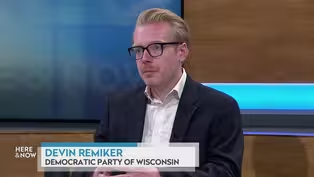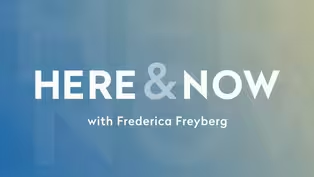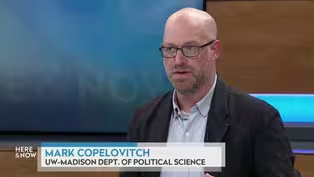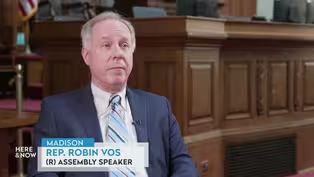Here and Now
Mike Pochowski on Transparency For Assisted Living Referrals
Clip: Season 2300 Episode 2349 | 5m 11sVideo has Closed Captions
Mike Pochowski on financial disclosures from assisted living facility referral agencies.
Wisconsin Assisted Living Association CEO Mike Pochowski discusses a bill in the state Legislature that would require more financial disclosures from referral agencies for assisted living facilities.
Problems playing video? | Closed Captioning Feedback
Problems playing video? | Closed Captioning Feedback
Here and Now is a local public television program presented by PBS Wisconsin
Here and Now
Mike Pochowski on Transparency For Assisted Living Referrals
Clip: Season 2300 Episode 2349 | 5m 11sVideo has Closed Captions
Wisconsin Assisted Living Association CEO Mike Pochowski discusses a bill in the state Legislature that would require more financial disclosures from referral agencies for assisted living facilities.
Problems playing video? | Closed Captioning Feedback
How to Watch Here and Now
Here and Now is available to stream on pbs.org and the free PBS App, available on iPhone, Apple TV, Android TV, Android smartphones, Amazon Fire TV, Amazon Fire Tablet, Roku, Samsung Smart TV, and Vizio.
Providing Support for PBS.org
Learn Moreabout PBS online sponsorshipsomething that can be signed into law.
>> Your time.
Thanks.
I appreciate your time.
>> As the baby boomer generation continues to age, the need for assisted living facilities in Wisconsin will continue to grow, with one recent estimate saying we'll need more than 60,000 additional beds over the next 15 years.
More and more seniors and their families are using a referral agency to help them choose a facility and a proposed bill at the Capitol would add some transparency to explain who's actually paying for those services.
Joining us now is Mike Pochowski, CEO of the Wisconsin Assisted Living Association, the trade group that represents those facilities.
And thanks for your time today.
>> Thank you for having me.
>> So let's start by explaining what is a referral agency and how do they interact between families and the facilities themselves.
>> Sure, there's essentially two types of referral agencies.
You have the local ones that are specifically geared towards Wisconsin, and you also have the national ones.
And so they really work with the families to try and find placement for those individuals, but they contract with assisted living facilities specifically, so they don't give you a full picture of who you could potentially move into, because they only give you referrals for those facilities that they contract with.
>> So part of this bill talks about making it obvious who pays, because the referral agencies claim there was no fee for the families.
They get paid on the back end.
But there's concerns that those fees are passed along.
>> Absolutely.
So what happens is they advertise themselves as being this free service to individuals and to families.
It's not a free service.
The fees are paid by the facilities that they contract with.
And so what happens, unfortunately, is that because those fees are very high, they get passed down to the consumer or to the residents that live in those facilities.
>> So the incentive for referral agencies to send clients to more expensive facilities, at least that's feel is happening for some of these agencies, correct.
>> For the most part, these these referral agencies charge anywhere between 85% to 100% of the residents first month rent and care.
And so what happens is that gives them the incentive to move individuals into higher priced facilities, because they can get a higher fee with that.
The problem with that, too, is that what happens is for these individuals, they spend down their assets more quickly, making them Medicaid eligible faster.
And so we already have a medicaid system that's already having lots of problems.
So it just enhances the problem with our Medicaid program.
>> So what would this bill do?
What's the number one takeaway that this would accomplish.
consumer transparency.
It lets everyone know that there's contracts between the facilities and the referral agencies, that the facilities are paying a high fee for these referrals.
And it just lets the consumer know that there's also other avenues they can go to try and find placements versus working with just a referral agency, who is only going to steer you towards a facility that they contract with.
>> So referral agencies advertise their services as almost doing the homework for the seniors or the families.
But what kind of homework should a family do before going through a referral agency?
>> Sure, absolutely.
They can contact their local adrc, which has a full list of all the facilities that are in that geographical area for that resident or family, or they can contact the facility directly.
Just kind of say, you know, what services do you provide?
What's what's the environment?
Can I come in tour, talk with the residents, talk with the staff, just go that route directly.
>> Now, you said there were national and local groups, and often we find those disparities.
Locals are more local.
Do they do a better job in your estimation?
>> In our part, there's probably pros and cons to both.
I think the nationals, you're right, is probably more just geared towards from a national perspective.
They can't focus just on one state.
For the ones that are more state based, they probably have more information and more resources from a state based or a local based resource.
>> So the industry overall is facing a shortage of beds, shortage of workers, low pay.
What are the steps involved with handling this new influx of patients?
Because obviously this is this.
This is just transparency.
If it passes, it's not fixing any of the other bigger problems.
>> Right.
Exactly.
You're absolutely correct.
So we right now we have a state budget that's being worked on right now.
And we're asking for, you know, continuation of funds in the family care or the Medicaid waiver program.
So we need to get more funds into into that program to help pay for workers, pay for the increasing cost of goods and services and everything else that's going on.
>> So for families that aren't connected directly in the same state or the same town as their their loved ones that need this care, what would you recommend them to do?
You said you can reach out, but that's time consuming.
That's why these first place.
>> Absolutely.
I would still say, you know, contact your local adrc.
They're very helpful.
They're a great resource.
And just look on the internet, find facilities that are in the area that you want to move into and look at those directly and contact them directly.
Obviously, there's national implications for Medicaid funding.
How does that play into some of these concerns?
>> We're very concerned if there's going to be national cuts into the Medicaid program, because that would trickle down to the states.
We already have a state budget that's looking to potentially cut Medicaid funds as well.
So we're definitely doing our best to kind of push for at least continuation of funds.
But yeah, we're we're hearing of cuts all across the board that's significant concerns for the long term care industry.
>> All right.
Mike Pawlowski, CEO of the Pawlowski, CEO of the
Devin Remiker on Charting Wisconsin Democrats Into 2026
Video has Closed Captions
Clip: S2300 Ep2349 | 7m 7s | Devin Remiker on Wisconsin Democratic candidates and supporters going into the 2026 cycle. (7m 7s)
Here & Now opening for June 20, 2025
Video has Closed Captions
Clip: S2300 Ep2349 | 56s | The introduction to the June 20, 2025 episode of Here & Now. (56s)
Mark Copelovitch on Costs of Tariffs and Wars on the Economy
Video has Closed Captions
Clip: S2300 Ep2349 | 5m 23s | Mark Copelovitch on how tariffs and wars disrupt costs for businesses and consumers. (5m 23s)
Speaker Robin Vos on Wisconsin's 2025-27 State Budget Status
Video has Closed Captions
Clip: S2300 Ep2349 | 7m 38s | Robin Vos on priorities for the 2025-27 Wisconsin state budget as negotiations continue. (7m 38s)
Providing Support for PBS.org
Learn Moreabout PBS online sponsorship
- News and Public Affairs

Top journalists deliver compelling original analysis of the hour's headlines.

- News and Public Affairs

FRONTLINE is investigative journalism that questions, explains and changes our world.












Support for PBS provided by:
Here and Now is a local public television program presented by PBS Wisconsin



